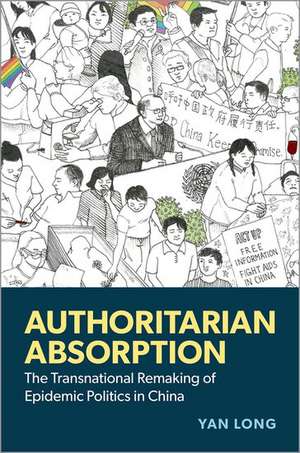Authoritarian Absorption: The Transnational Remaking of Epidemic Politics in China
Autor Yan Longen Limba Engleză Hardback – 4 feb 2025
Preț: 205.52 lei
Preț vechi: 233.79 lei
-12% Nou
Puncte Express: 308
Preț estimativ în valută:
39.33€ • 41.17$ • 32.54£
39.33€ • 41.17$ • 32.54£
Carte disponibilă
Livrare economică 04-10 martie
Livrare express 01-07 martie pentru 66.50 lei
Preluare comenzi: 021 569.72.76
Specificații
ISBN-13: 9780190900199
ISBN-10: 0190900199
Pagini: 408
Dimensiuni: 169 x 237 x 31 mm
Greutate: 0.74 kg
Editura: Oxford University Press
Colecția OUP USA
Locul publicării:New York, United States
ISBN-10: 0190900199
Pagini: 408
Dimensiuni: 169 x 237 x 31 mm
Greutate: 0.74 kg
Editura: Oxford University Press
Colecția OUP USA
Locul publicării:New York, United States
Recenzii
Authoritarian Absorption tells the fascinating story of HIV/AIDS policy in China, where rural blood contamination victims were heartbreakingly sidelined and gay men were unexpectedly incorporated as state agencies developed capacities to control viruses - all under the influence of global networks of activists, experts, and funders. Deeply researched and brimming with theoretical insights, this book reveals the tangled threads connecting transnational social movements and China's rising infrastructural powers.
Deftly sociological and quietly sympathetic, Long's multi-site, multi-year ethnographic study announces the arrival of an academic star. Her ingenuity and persistence show us how fieldwork research on contemporary China is still possible. The generative impact of international intervention on Chinese institutions, vividly illustrated by the stories of the HIV/AIDS epidemic, offers a hopeful lesson for our pessimistic age: the genetic make-up of communism is not a foregone conclusion, and China is always a work in progress.
Why would an autocratic regime with a peasant base and a homophobic history abandon farmers who contracted HIV/AIDS through the commercial blood trade and embrace gay men who fell ill in cities? How did urban homosexuals overtake impoverished peasants in China's hierarchy of HIV/AIDS victimhood? And what do the answers tell us about the interactions of local officials, western donors, international organizations, and health activists in the Global South? Yan Long answers these questions in her painstaking study of the Chinese case, shedding new light on both epidemic politics and authoritarian survival in China and beyond. A book that's as empathetic as it is insightful.
Deftly sociological and quietly sympathetic, Long's multi-site, multi-year ethnographic study announces the arrival of an academic star. Her ingenuity and persistence show us how fieldwork research on contemporary China is still possible. The generative impact of international intervention on Chinese institutions, vividly illustrated by the stories of the HIV/AIDS epidemic, offers a hopeful lesson for our pessimistic age: the genetic make-up of communism is not a foregone conclusion, and China is always a work in progress.
Why would an autocratic regime with a peasant base and a homophobic history abandon farmers who contracted HIV/AIDS through the commercial blood trade and embrace gay men who fell ill in cities? How did urban homosexuals overtake impoverished peasants in China's hierarchy of HIV/AIDS victimhood? And what do the answers tell us about the interactions of local officials, western donors, international organizations, and health activists in the Global South? Yan Long answers these questions in her painstaking study of the Chinese case, shedding new light on both epidemic politics and authoritarian survival in China and beyond. A book that's as empathetic as it is insightful.
Notă biografică
Yan Long is Assistant Professor of Sociology at the University of California, Berkeley. She is a political and organizational sociologist studying the interactions between globalization and authoritarian politics across empirical areas such as public health, civic action, urban development, and digital technology.
